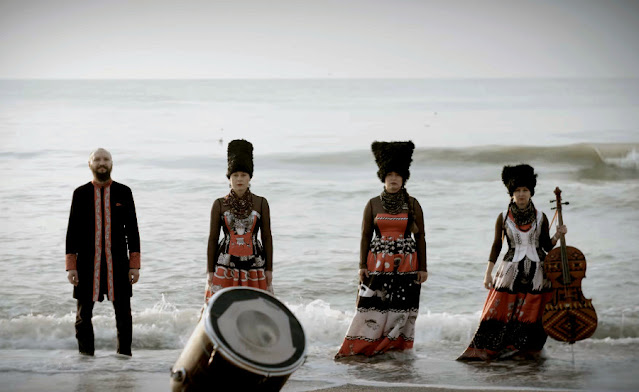How is Mental Illness Portrayed by the Entertainment Industry?
It's mental health awareness week and its also the lead up to the Romford Film Festival, so in this weeks blog I thought that I should take a look at how mental illnesses, such as depression and bi-polar disorder, are portrayed in three mediums, television, musicals and film. I will ask whether the representation of mental illness is good enough in the current entertainment industry, whilst highlighting what I believe to be the best media portrayal of mental illness.
Over the past decade television has begun to find its footing in portraying mental illness well. It of course isn't quite there yet, there are still too few shows which place focus on a mentally ill character, rather most only hint at a character suffering from mental illness, if at all. Whilst I am not master of television and certainly haven't seen every TV show that has a mentally ill character, I can highlight two series which I personally believe portray mental illness well. The first is Bojack Horseman, that tv show I talk about far too much. It places heavy focus on the mental health issues founded in 3 out of its 5 main characters. Which in itself is a novelty as so often if there are any mentally ill characters there is only one. Bojack does an amazing job at drawing attention to multiple aspects of mental illnesses, and the varying paths it can lead us down. The series doesn't end with any of the characters magically being cured but highlights the slow process of being healed, that therapy and pills aren't a magic potion but also the extreme harm in trying to ignore your mental illness can bring. The fact that the show has multiple characters with mental illness allows the character Bojack to be a terrible person, yet still relatable, without the notion that having a mental illness makes you a terrible person. If you're interested in Bojack Horseman but don't want to commit to the entire show I would recommend the episodes 'Stupid Piece of Sh*t' and .'Good Damage', as both have extremely accurate yet creative portrayals of depression. If your searching for a show that portrays mental illness well without it being the sole focus of the series, try Jessica Jones. The series is about a P.I. with super strength, trying to avoid being a hero. It accurately portrays a woman struggling with PTSD and alcoholism, which has resulted from a number of horrific life events such as her ex abusing and sexually assaulting her. Whilst Jessica's PTSD isn't the main aspect of her character her mental illness is never really ignored or forgotten through out the series, instead it is drawn upon to deepen her character and provide somewhat cathartic developments in her story arch.
Whilst TV representation is improving I personally think that theatre is the medium which often portrays mental illness the best. There are multiple musicals and plays which portray different types of mental illness accurately and fairly, without straying away from the more hard-hitting aspects of it. Two great musicals that portray mental illnesses extremely well is Next To Normal and Spring Awakening. I wont go into too much detail about Spring Awakening, considering I have already written a blog on this wonderful show, but I will say that the show does a perfect job at portraying mental illness in teens and how the stress of school and peer pressure can often lead a teenager to develop depression. Next To Normal is a musical about a mother (Diana) suffering with bi-polar disorder. The show is incredibly heart-breaking yet remains heart-warming at the same time. Diana is portrayed sympathetically throughout the show as not to demonise the mentally ill, but the worst aspects of her illness are never shied away from. Instead the show highlights how deep Dianas struggles truly are and how her family is indirectly effected by her illness, her daughter also suffering from depression. Indeed, Next to Normal is a great portrayal of bi-polar disorder with a bittersweet ending that never forgets how serious the condition is. Two other musicals of note are 'Natasha, Pierre and the Great Comet of 1812' and 'Be More Chill', whilst neither of these show place strong focus on mental illness both feature songs which really highlight the mental struggles of their characters, 'Dust and Ashes' from the Great Comet focuses on Pierre's depression and self-hatred, whilst 'Michael in the Bathroom' highlights Michaels anxiety. Both songs portray excellently the feelings that often come with these mental illnesses and eloquently puts into words the struggles of such illnesses. Indeed, this is only the tip of the iceberg, as so many musicals do a wonderful job at portraying mental illnesses.
Mainstream Film however does a far less apt job at portraying mental illness accurately and respectfully. When one considers that around a 1/4 of people suffer from mental illnesses in a given year it is hard to claim that there is enough representation in mainstream film. Indeed, it is rare that we ever see a person suffering with mental illness in any movie, and when we do it is often only hinted at and forgotten by the end of movie. Then when a movie finally does have a mentally ill character they are often vilified. One extremely terrible portrayal of mental illness comes from the movie Split which not only portrays D.I.D. inaccurately but produces a negative stigma around the illness by creating a character who is a monstrous murderer. This pattern is repeated over and over again in multiple films. Whilst The Joker may create a more realistic portrayal of mental illness and provides us with a somewhat sympathetic character in Arthur Fleck, we are yet again met with a murderous mentally ill person, when the mentally ill are more likely to harm themselves than others. The constant portrayal of the murderous mentally ill wouldn't be quite so bad if we had a greater amount of heroes and protagonists inflicted by mental illness, yet there are very little to choose from. Even in films which portray mental illness generally well, we are often left with neat happy endings, such as in Silver Linings Playbook, where it is implied the mentally ill character is cured, despite mental illness being messy and often never quite disappearing. Indeed, it's not hard to conclude from this that we lack a great deal of accurate portrayals in mainstream movies.
Yet, this is only to discuss mainstream movies and not independent film. Indeed, independent film often does a far better job at portraying mental illness as the filmmaker often wants to tell a story of something they or someone they love has experienced without paying attention to how profitable it would be. As such there are many independent films which have an accurate and compelling portrayal of mental illness. Two such movies are being shown at Romford Film Festival next week. 'Lead Belly' features a veteran struggling with PTSD, whilst ‘Let’s talk about George' portrays a man struggling with depression, both are extremely accurate portrayals of these illnesses with are also extremely hard hitting. (you can find out more about them and their showtimes here)
Indeed then we can say that overall how mental illness is portrayed by the entertainment industry is mixed. Whilst Musical theatre and independent film seems to be leading the way to accurate portrayals of mental illness, mainstream film is still languishing behind. And given that mainstream film is that which most pay attention to, it needs improvement and quick.





Comments
Post a Comment